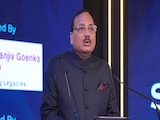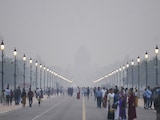As the Taliban announced its new hardline interim government on Tuesday, Pakistan's stamp was evident in the inclusion of two Haqqanis in the cabinet, including Sirajuddin Haqqani as Interior Minister, sparking concerns in India.
Sirajuddin Haqqani, the son of anti-Soviet warlord Jalaluddin Haqqani who founded the Pakistan-linked Haqqani Network, is on the FBI's most wanted list for terrorism. So is his uncle Khalil Haqqani, who was named acting minister for refugees.
Two other members of the Haqqani clan were also named as part of the interim government, a sign of Pakistan's role in the Taliban-run government that was announced after the chief of the Pakistani ISI visited Afghanistan last weekend. Another dead giveaway is the last minute edging out of Mullah Abdul Ghani Baradar, the Taliban's political envoy until recently based in Doha, Qatar in favour of a hardline Taliban leader, Mullah Hassan Akhund, for the post of Prime Minister.
Analysts believe the Doha faction of the Taliban, considered politically pragmatic, has been marginalised in the final government list.
Another member of the Doha group, the Taliban's Sher Abbas Stanikzai, who met India's envoy in the Qatar capital on August 31, has been made Deputy Foreign Minister.
Sirajuddin and Khalil Haqqani are still listed as wanted by the US, with millions of dollars in bounties on offer. Sirajuddin Haqqani has been one of two deputy leaders of the Taliban since 2016 and has a $10 million bounty on his head.
For the world, especially the US, the irony of having to deal with a designated terrorist couldn't be starker.
For India particularly, the role of the Haqqanis in the new Taliban government is a huge worry. The Haqqanis are said to be behind the 2008 bombing of the Indian Embassy in Kabul, in which 58 were killed. Pakistan has denied the charge that its intelligence ISI planned the attack.
The Haqqani network is known for its use of suicide bombers in several attacks over the years. The network is also accused of holding kidnapped Western citizens for ransom.
Afghanistan's Ambassador and Permanent Representative to the UN Ghulam Isaczai, tweeted: “17 of the 33 Taliban cabinet members are on the UN sanction list. This includes their interim PM, two Deputy PMs, Interior, Defense and Foreign Affairs.”
A UN spokesperson, responding to a question on whether the UN would recognise the Taliban government, said the UN “doesn't engage in recognition of governments” and it was for member governments to decide.
“Regarding the sanctions list, as you know, under resolution 1267, there is a sanctions list. And it''s up to the members of the Security Council and the relevant 1267 Sanctions Committee to see whether names are added or omitted or dropped from those lists. The list has changed over the years and names have been dropped, but that has to follow a procedure in the Security Council itself,” said Farhan Haq, Deputy Spokesman for the UN Secretary-General.















